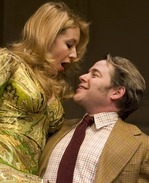SITE GUIDE
SEARCH
REVIEWS
REVIEW ARCHIVES
ADVERTISING AT CURTAINUP
FEATURES
NEWS
Etcetera and
Short Term Listings
LISTINGS
Broadway
Off-Broadway
NYC Restaurants
BOOKS and CDs
OTHER PLACES
Berkshires
London
California
New Jersey
Philadelphia
Elsewhere
QUOTES
TKTS
PLAYWRIGHTS' ALBUMS
LETTERS TO EDITOR
FILM
LINKS
MISCELLANEOUS
Free Updates
Masthead
A CurtainUp Review
The Philanthrophist
So why is the current The Norman Conquests not to be missed, while The Philanthrophist seems such an unnecessary revival? It begins with the play itself. Beneath Ayckbourn's domestic mayhem and structural gimmickry, there's real depth. Strip Hampton's drawing room farce transported to a London university setting of its barrage of bon mots and the clever prologue that ends up with a send-up of Chekhov's dictum that a gun seen in act one must show up again before the curtain falls — and all that's left is a talky play that does show its age. That said, if you read our London critic, Lizzie Loveridge's review of the Donmar Warehouse revival in 2005, there's still some life and amusement to be teased out of Hampton's conceit: inverting Moliere's misanthropic Alceste into a milktoasty London academic whose persistent niceness ultimately has the same effect on others as Alceste's tell-it-like-it-is nastiness. That brings us to the Roundabout production's even bigger problem: the casting of a big name star, Matthew Broderick. Having played these sort of comic nebbishes made Broderick a natural for the part of the anagram loving title character. The problem is that unlike Simon Russell Beale (the Donmar's Philip) who can bring out the nuances and quirks of any character he plays, Broderick seems to have turned into a parody of himself. What you see on stage is the accountant who wants to be a producer, the fussy other half of the Odd Couple. And here he is again— same shtick but without anything added except a not very successful British accent. While the chance to hone his expertise as a nerdy type is what must have attracted him to the play, Broderick was unable to take enough of what he does well without coming off like a broken record. Perhaps, conscious that he's unable to rise above his familiar persona, accounts for the fact that he often looks bored and slightly pained, even a the the curtain call. David Grindley has proved himself to be an excellent director with a special feel for period pieces including the Roundabout's Pygmalion; also the under-appreciated Journey's End. Perhaps he could have transferred the energy of the Donmar production as Matthew Warchus did with The Norman Conquests, if he'd been able to bring along the entire cast instead of just Anna Madeley. Not that the cast now on board isn't excellent: Steven Weber is appropriately smooth and self-absorbed as Philip's colleague Don and the show actually promises to explode into the very funny comedy it's meant to be with the arrival of Jonathan Cake as Braham, the hilariously obnoxious author. He'd be a riot even if he didn't have the best lines, given the maroon velvet suit with it's 70s style flared pants (courtesy of costumer Tobin Ost, who like the set, lighting and sound designers have brought their skills to the American Airlines Theater). Anna Madeley ably reprises her role as Philip's fiancee; Jennifer Mudge does the sexually aggressive Araminta with panache; and Smantha Soule, who is usually s seen in much larger parts, does as much as she can with the wordless Liz. Entertaining as Philip's guests are, Broderick's out-to-lunch performance in the pivotal role has cast a dysfunctional pall over the entire production. It's as if Mr. Grindley had rowed rather than flown his production across the pond and in the process gotten stuck in a slow staging mode that makes the two hour play feel like the 24-hour period it covers. Rather than go further into the plot details, I'll point yout to Lizzie's review which covers all the salient events as well as the set details. London Review New York Production Notes The Philanthropist By Christopher Hampton Directed by David Grindley Cast: Matthew Broderick (Philip), Jonathan Cake (Braham), Anna Madeley (Celia), Steven Weber (Donald), Tate Ellington (John), Jennifer Mudge (Araminta) and Samantha Soule (Elizabeth). Sets by Tim Shortall Costumes by Tobin Ost Lighting by Rick Fisher Sound by Gregory Clarke Dialect coach: Gillian Lane-Plescia Running time: 2 hours 10 minutes, with intermission Roundabout Theater Company atthe American Airlines Theater, 227 West 42nd Street (212) 719-1300. From 4/10/09; opening 4/26/09; closing 6/28/09 Reviewed by Elyse Sommer 4/28/09 London Review REVIEW FEEDBACK Highlight one of the responses below and click "copy" or"CTRL+C"
Paste the highlighted text into the subject line (CTRL+ V): Feel free to add detailed comments in the body of the email. . .also the names and emails of any friends to whom you'd like us to forward a copy of this review. You can also contact us at Curtainup at Facebook or Curtainup at Twitter |
London review of The Philanthrophist by Lizzie Loveridge
|
Nothing is cruder than an excess of subtlety.
---- Braham |

Simon Russell Beale as Philip, Anna Madeley as Celia and Siobhan Hewlett as Araminta.
(Photo: Stephen Cummiskey) |
Simon Russell Beale plays Philip, the Oxford academic and lecturer in philology who lists his hobbies as working out unusual and intricate anagrams. Philip's personality is all kindness and his nature is sweet. He is the type of man that people, and more especially women, are going to take advantage of. He explains that he was unable to teach English literature because he likes everything, he is unable to criticise. Philip describes his job as combining "the boredom of the science faculties with the uselessness of the arts faculties".
The prelude to the play is so very clever and it must have marked out the young Christopher Hampton for notice. It reminded me of Stoppard's The Real Thing when everything isn't as it seems and the audience are strung along. Philip and Donald (Danny Webb) are in a tutorial with a student, John (Simon Bubb), discussing John's play which has a dramatic but unbelievable ending. The first act continues in Philip's rooms in college where his (undergraduate and much younger) fiancêe Celia (Anna Madeley) is cooking dinner for six. First on the guest list is fellow don, and English lecturer, Donald, colleague and confidant of Philip. They are to be joined by a writer, Braham (ghastly, affected and pretentious) (Simon Day), Araminta (sexually promiscuous) (Siobhan Hewlett) and (as quiet as a mouse) Liz (Bernadette Russell). After a pairing off with lifts offered home, the six mix and meld. The next morning they reap the aftermath of the previous night's sexual activity or even inactivity.
The play was described by its author as a bourgeois comedy. Hampton's wit has not dated at all and the first act is very funny, full of social comedy and paradox and underlining the ridiculous in our behaviour.
Simon Russell Beale is most visually expressive and in the small space of the Donmar Warehouse we are treated to a close up of his full range of bug eyed consternation, puzzlement and quizzical reflection. When Araminta makes Philip the object of her lust, we know that the outcome will be a disaster. Araminta launches her unsubtle pass by giving Philip a meant-to-be erotic scalp massage. The effect is not to arouse him but only to muss up his hair, giving him a very curious bouffant appearance. Socially inept, he is unable to turn down the rampant Araminta but equally unable to put up any kind of a physical performance. I suppose some of Philip's awkward situations develop from his inability to condemn his fellow man. Anna Madeley is quite shrewish showing her dissatisfaction with her relationship. She and Philip seem very unsuited.
Donald expounds his theory dividing all mankind: either we live a lie or we live according to something which we believe to be the truth but is in fact a lie. Either way we are fooled but the difference is in whether we are fooling ourselves or others. The outcome for Philip is that despite his mild manners and kind nature he upsets as many people as the overly frank Alceste. The playwright intersperses more and more incredible events such as the assassination of the Prime Minister and his cabinet, but these fail to cause so much as a ripple in the academic mill pond.
The set is beautifully furnished -- aesthetically pleasing rooms, an opulent bergère chair, a padded leather sofa, an antique desk and bookcases and shelves high up, full of cream covered books. Each scene is introduced with the word of one of the seven deadly sins which I found superfluous. The costume rejects the full flared excesses of the 1970s but, again like an anagram, uses modern day clothes with a hint of those eclectic fashions.
David Grindley has assembled a faultless cast for this revival and it is a delight to see Simon Russell Beale's prodigious talent in close up. Hampton's clever play has many parallels with the Molière but it is as if he has muddled up the ideas and rearranged them, like an anagram so that they bear a similarity, are made up of the same elements but the result is different.
London Production Notes Cast: Simon Russell Beale, Simon Day, Siobhan Hewlett, Anna Madeley, Simon Bubb, Bernadette Russell, Danny Webb
Design: Tim Shortall
Lighting: Rick Fisher
Sound: Gregory Clarke
Running time: Two hours ten minutes with an interval
Box Office: 0870 060 6624
Booking to 15th October 2005
Reviewed by Lizzie Loveridge based on 13th September performance at the Donmar Warehouse, Earlham Street, London WC2 (Tube: Covent Garden)
Try onlineseats.com for great seats to
Wicked
Jersey Boys
The Little Mermaid
Lion King
Shrek The Musical

South Pacific

In the Heights

Playbill 2007-08 Yearbook

Leonard Maltin's 2008 Movie Guide


Wicked
Jersey Boys
The Little Mermaid
Lion King
Shrek The Musical

South Pacific

In the Heights

Playbill 2007-08 Yearbook

Leonard Maltin's 2008 Movie Guide



